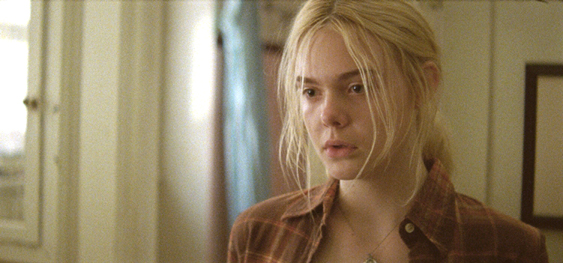Seen through the eyes of one’s child, few figures, however legendary and beloved by the public, can maintain the same sense of awe that they engender in their fans. Here, memoirist and co-screenwriter Amy-Jo Albany paints a vivid portrait of her father, jazz pianist Joe Albany, who at the height of his celebrated career played with the likes of Charlie Parker and Miles Davis. Albany focuses on Joe during the 1970s in the grips of a heroin addiction after his star had faded, portraying him as a loving and well-meaning but unstable man whose demons time and again prevent him from fulfilling his role as a father.
Joe (John Hawkes) evokes by turns sympathy and disbelief as he stumbles his way through parenthood. Many of his actions seem straight out of an Alcoholic Anonymous “rock-bottom” confessional, such as when he sends 13-year-old Amy (Elle Fanning) to sleep in the bathroom so that he and a friend can shoot up in the one-room hotel room where the two live.
During Joe’s frequent breaks from fatherhood, 13-year-old Amy is often left to her own devices, diving into the equally dysfunctional worlds around her: forming a short-lived friendship with Alain (the always charismatic Peter Dinklage), who illegally squats in their flophouse and stars in porn films by night (in a strange, almost psychedelic, David Lynch–esque sequence), and watching cartoons in the hotel lobby with a young boy and his drug-addicted prostitute mother (Taryn Manning).
Amy’s paternal grandmother (a soothing Glenn Close) steps in to parent when Joe can’t hold it together anymore, providing a much-needed gentle presence—though she clearly has her own issues as she attempts to step out of the role of enabler. Amy’s actual mother (Lena Headey) stands in stark contrast. An alcoholic, she, like Joe, forces Amy to take on the responsible caretaker role, yet she lacks the warmth that allows viewers to forgive Joe his mistakes.
Messy and unstructured, the film is light on plot but excels at mood. The dark 16 mm palette evokes the grungy, underground 1970s perfectly. Characters slip in and out of the story haphazardly, lending a disjointed, confused feeling that mirrors the confusion of a young adolescent attempting to make sense of the happenings around her.
Hawkes is superb, imbuing his portrait of an almost horrifically narcissistic drug abuser with touches of almost aching tenderness and affection; viewers will be torn between empathy for Joe and exasperation at his self-indulgent actions. The script avoids the glamour of the tortured artist; there’s a mundane repetitiveness to Joe’s addiction. There are no benders, no over-the-top intoxicated confessions (a scene where Amy helps her falling-down-drunk mother back to the hotel room feels like the sole misstep here). Instead, the filmmaker derives discomfort from his depressingly drab everyday existence.
Fanning, too, delivers a poignant performance, though it’s not always clear what motivates Amy-Jo, such as in an intimate scene with Alain, which walks the line between sensual and daughterly. The young actress conveys a believable vulnerability, yet she’s no dewy-eyed naïf; despite her young age, she’s been forced to grow up fast. Though she obviously hopes for more from her father, she rarely seems surprised when he doesn’t deliver.
There’s admittedly very little story here, but there is a sense of suspense in wondering what will become of Amy in years to come. The film fast forwards two years (Joe has been away in Europe and returns), and Amy now has a musician boyfriend (Caleb Landry Jones) with dangerous proclivities of his own. It’s hard not to hold one’s breath, hoping against hope that her experiences with her father won’t affect her, but Amy’s own baggage is quickly building up.
The lack of cohesiveness and the slow pacing make this a drama that many viewers will give up on. But it treads where many others fear to go, offering—for those willing to stay with it—a dark, authentic glimpse into a relationship fraught with pain, and tenderness.

















Leave A Comment